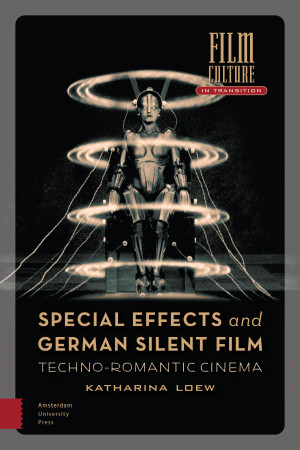"Katharina Loew’s Special Effects and German Silent Film is one of the latest and most prestigious publications in the expansive Film Culture in Transition series from Amsterdam University Press. Loew’s new study covers one of the most important and interesting periods in early film history, and brings a range of industrial, aesthetic and critical perspectives to illuminate an intriguing central theme of ‘techno-romanticism’. [...] [This book] will no doubt become a standard reference work concerning its central topics."
- Will Kitchen, Early Popular Visual Culture, 2021
"This is an original, deeply-researched approach to the fascination produced by German silent cinema, with welcome emphasis on the contributions of creative technicians working with their directors. The author evokes films with loving, accurate finesse. Her perspective is especially valuable in its use of key German-language materials from the period."
- Janet Bergstrom, University of California, Los Angeles
"Loew’s masterful analysis, including never-before-seen production details of the most emblematic films of German cinema’s Golden Era, decisively shifts special effects from the margins of film history to the very center of our conversation about silent cinema’s claims to art."
- Scott Curtis, Northwestern University, author of The Shape of Spectatorship: Art, Science, and Early Cinema in Germany
"Meticulously researched and carefully argued, Special Effects and German Silent Film is a superb study of how technology, imagination, and a flair for the occult orient cinema toward its enchanted Romantic past and catapult it to its sublimely high-tech future."
- Jennifer Fay, Vanderbilt University, author of Inhospitable World: Cinema in the Time of the Anthropocene
"Loew’s monograph sheds light on an understudied topic within film studies, especially in comparison to other cinematic techniques: special effects. Her research makes a compelling case for the impact of special effects on debates about cinema’s value as an art form. Future scholars of this period will find this monograph invaluable, as much for the fascinating argument as for the vast repertoire of archival material that Loew offers."
- Sean Lambert, German Studies Review, Vol. 45, No. 3
"More than a history of a single facet of the German
cinema industry, Loew’s book reveals the wide-ranging impact of material practices that shaped the forms of wonder that we continue to experience in our technologically mediated world."
- Anne Eakin Moss, MLN, Vol. 137, No. 3, April 2022
"Reflecting film studies’ ongoing material turn, it is an important media - archaeological corrective to often presentist scholarship on visual effects. while also offering valuable insights on many other timely topics within the discipline, including studio architecture, camera movement and manipulations of scale."
- Paul Flaig, Screen, Vol. 63, No. 2, Summer 2022

